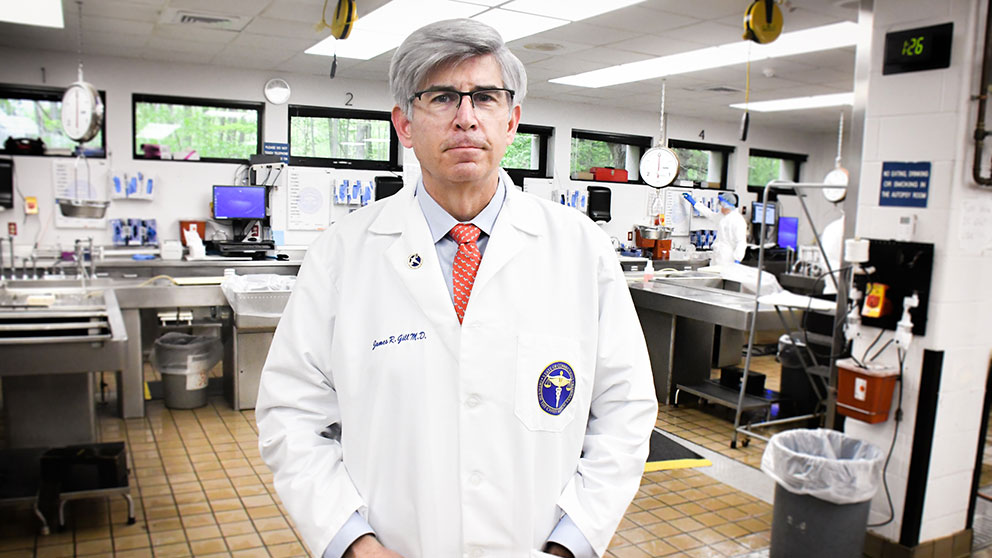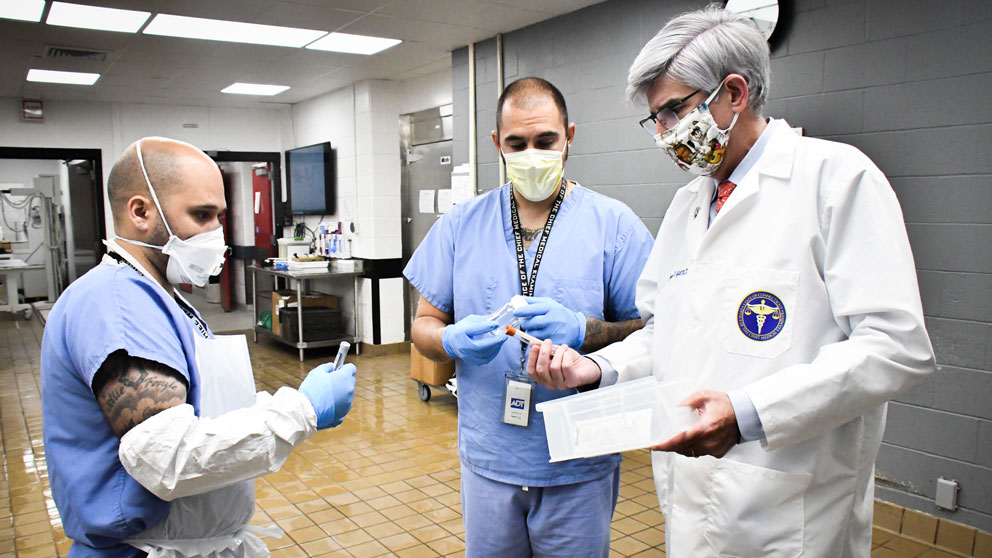
James Gill, M.D., is the chief medical examiner for the state of Connecticut. Photo by John Atashian.
How COVID-19 testing by the Connecticut Medical Examiner’s office supports public health.
It’s a standard scene in TV police dramas: An observant medical examiner finds a cause of death that propels the detectives to track down a suspect. But when the cause of death is COVID-19, the medical examiner has a very different and more vital role: Document the spread of the disease and prevent its transmission.
James Gill, M.D., is the chief medical examiner (CME) for the state of Connecticut. “The current COVID-19 pandemic highlights our work in two important ways,” he says. “The first is that we are in many ways the ‘investigative’ arm for vital statistics, making sure that deaths are properly reported and certified. Knowing how many people die from COVID-19, along with the circumstances, contributing conditions and where they died (e.g., at home, a nursing home or a hospital) are all important to know for public health purposes.”
The second, Gill says, “is for families. Our investigation of unsuspected COVID-19 deaths not only ensures that the COVID-19 deaths are properly identified and certified, but it provides important health information for potentially exposed family members and first responders. So while you may think we’re dealing only with the dead, our work really can help the living.”
The CME office is sending their cases for testing to The Jackson Laboratory (JAX) for Genomic Medicine, located in Farmington, Conn., on the same UConn Health campus as Gill’s office. “We’ve been very impressed with their turn-around time,” Gill says. “You send it out in the morning and six hours later the results are back, whereas for a lot of other tests we have to wait for days. Getting results that same day makes a big difference for a lot of people.”
Gill explains, “Say we get a call from a first responder, and he wants to know whether or not the person he brought to the CME is infected. The sooner we can let him know, the sooner he can either get back to work helping other people or go into quarantine to protect others.”
In Connecticut, COVID-19 has claimed the lives of about one in 10 of the state’s 30,000 confirmed cases to date. Beyond that, statistics fail to reflect a “typical” case of the disease. As remembered in the Hartford Courant, fatalities have included a 57-year-old chef from Watertown, a pair of sisters in their early 70s who lived together in New Britain, a 32-year-old father of two in Bethel, a 61-year-old Hartford native and former high school basketball star, and an 18-year-old woman from Waterbury.

Dr. Gill meets with members of his team at the Connecticut Medical Examiner's Office. Photo by John Atashian.
“Most of the cases that we see are people who died outside the hospital—at home or at a nursing home, and they had not been tested for the virus before they died,” Gill says. And, part of the CME’s responsibility is to interpret the results of postmortem COVID-19 testing in the context of the entire case.
For one thing, COVID-19 causes damage to the lungs, but that can be very similar to the effects of influenza and other viruses. For another, COVID-19 may not be the only factor in a given fatality. “We have had cases — infants as well as adults — where we had to determine whether the infection was causative of the death or incidental. We don’t want to over count deaths due to COVID-19 any more than we want to miss counting them.”
Connecticut happens to be one of America’s leading centers for forensic science and medicine, and Gill is at its vanguard. Besides his role as CME, Gill has clinical faculty appointments in Pathology at both the University of Connecticut and Yale University Schools of Medicine. Gill is launching a forensic pathology fellowship program at the Connecticut CME office next year, expanding the state’s academic environment in forensics.
The University of New Haven (UNH) and its Henry C. Lee Institute of Forensic Science awarded Gill with its 2013 Distinguished Forensic Science Award. “James Gill is an exceptionally dedicated and diligent leader, in a highly demanding clinical environment,” says Robert Alvine, a longtime trustee of UNH and the former chair of the JAX board of trustees.
Alvine was instrumental in founding one of the nation’s first forensic science programs at UNH, and in establishing the top-ranked Henry C. Lee College of Criminal Justice and Forensic Science there, named for the world-famous scientist and former director of the Connecticut state forensic laboratory. “Before forensic science, law enforcement lacked scientific tools,” Alvine says. “That’s why a lot of the wrong people got arrested and put in jail over the years. Henry Lee, UNH and the state of Connecticut had major roles in bringing the integrity of forensic science into the justice system.”
Gill’s interest in forensic pathology began after his first year at UConn School of Medicine, during a summer internship at the Connecticut CME Office. “What interested me about forensic pathology were the many aspects of the work,” he says. “There is the investigative component, where we try to figure out what happened, and then putting that in the bigger picture of public health and the criminal justice system.”
“Even more important,” he adds, “is interacting with the families, listening to their concerns and answering their questions.”
Gill was appointed chief CME in 2013, after 17 years in the City of New York Medical Examiner’s office. Soon after arriving in Connecticut, he reached out to Charles Lee, Ph.D., scientific director of JAX Genomic Medicine, to talk about possible partnership opportunities.
When the need for COVID-19 testing arose in early 2020, Gill says, “the state lab was kind of overwhelmed at that point, so we were looking for another resource to have that testing done. And JAX is right next door, so it worked out very well for both of us.”
When it comes to testing, Gill says, “the sooner the better, for everyone.”